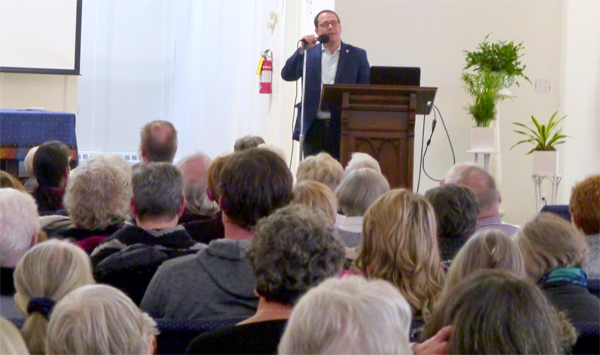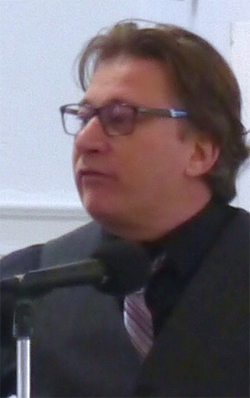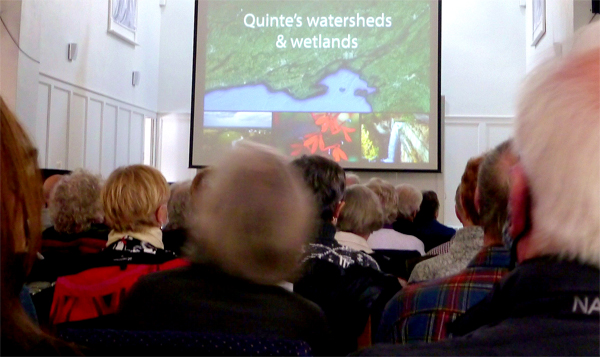Green leader calls for people power over Bill 23 ‘that will make life less affordable’
Administrator | Feb 09, 2023 | Comments 4

By Sharon Harrison
Ontario Green Party leader and MPP Mike Schreiner was in Picton Wednesday to take part in a town hall-style information session on the province’s wetlands and how Bill 23 (More Homes Built Faster Act) threatens them.
The packed, standing-room-only event, organized by the Bay of Quinte Green Party of Ontario, held at St. Andrew’s church, was open to all.

Mike Schreiner
Schreiner spoke about the importance of wetlands and Bill 23 generally, as well as the greenbelt. He also addressed the important role conservation authorities provide, and their diminished responsibilities resulting from the bill.
He spoke to Ontario’s housing crisis, the climate emergency the municipality has declared, as well as the cost and risk of the climate crisis fuelled by extreme weather events.
“Bill 23 is not a housing bill; it is a bill that will enable a handful of land speculators to turn millions into billions at our expense,” Schreiner said, adding there is a whole generation of young people wondering if they will ever have the dream of home ownership.
“We need to build more homes. We need to build affordable communities where people want to live close to their family and close to where they want to work. Bill 23 will do nothing to address that crisis; it will make the crisis worse.”

Brad McNevin
The event also welcomed guest speaker Brad McNevin, Quinte Conservation CAO who provided an overview of Quinte Conservation’s role and how conservation authorities in general benefit municipalities through many services and programs.
Most significantly, he spoke to how changes within Bill 23 will affect the 101 provincially-significant wetlands in Ontario, particularly at it pertains to changes to the wetland evaluation system, and the impact to local watersheds and wetlands.
Present also were members of various local organizations fighting Bill 23, including the Prince Edward County Field Naturalists, the South Shore Joint Initiative, Quinte Field Naturalists, Friends of Salmon River, and Friends of Napanee River.
 Local photographer Phil Norton took the audience on a visual journey through the area’s precious wetlands and watersheds, wildlife and environs with a thoughtful collection of photographic images.
Local photographer Phil Norton took the audience on a visual journey through the area’s precious wetlands and watersheds, wildlife and environs with a thoughtful collection of photographic images.
“It’s so important to think of our wetlands in that way when we can actually picture them in our minds; when you are familiar with places, then you actually care about them, and that’s what’s important,” said Lori Borthwick, Bay of Quinte Green Party of Ontario president. “One of the things we need to look forward to is leadership, community and groups like this, people getting together to do what we can to save our lands and save our natural important spaces.”
A question and answer period followed the presentations, which were followed by a light lunch.
Schreiner told the crowd Bill 23 is going to raise property taxes in most places across the province.
“This is because they are removing development charges, not for deeply affordable homes, and I’d be OK with that, especially if the province replaced that money and actually got back into supporting financial infrastructure our communities need, but it’s not for that” and will not lead to more affordable homes.
“It’s just going to make life less affordable for home owners and renters as those property tax increases are going to be passed on,” he said. “It’s going to put the places we love at risk.”
He said one aspect of Bill 23 that hasn’t had much attention is its effect on Ontario’s wetlands, especially the change to the Ontario wetland evaluation system.
“The change to the evaluation system puts all of our drinking water at risk,” Schreiner said. “It puts a property at risk for flood damage because wetlands and green space and the role conservation authorities play in protecting those are vital at cleaning our drinking water and protecting us from flooding.”
McNevin said Quinte Conservation and conservation authorities across the province are not opposed to development.
“We are really not, we recognize that people need a place to live, they need a home to live in. but we want to make sure their homes are built in the right location and not in a wetland, not in a floodplain, not in one of those sensitive lands.”
Schreiner said he has put forward Bill 44 and Bill 45 that begins to address the housing affordability crisis.
“We put forward a housing strategy that some have called a master class plan and building the actual affordable homes and communities in one, and none of it requires us to pave over farmland that feeds us and contributes $50 million to Ontario economy and over 800,000 jobs across the food and farming sector,” said Schreiner.
“None of it requires to pave over that, none of its requires us to pave over the wetlands that clean our drinking water and that protect us from flooding , none of it requires us to open the people’s greenbelt for development, none of it requires us to destroy so much of what all of you love about living here.”
Approximately 90 per cent of the population of Ontario benefits from having a conservation authority and the programs and services they deliver, according to McNevin.
“We help protect the environment, protect the sources of drinking water and keep them safe from natural hazards,” he said. “That’s what we here to do and we do a really good job to that end.”
Quinte Conservation has an area of more than 6,000 square kilometres stretching across 18 municipalities serving about 150,000 people.
McNevin noted that historically Quinte Conservation received about 80 per cent of its funding from the province of Ontario, with 20 per cent made up of donations, self-generated money or municipal levies.
He also noted how municipalities are Quinte Conservation’s single most important partner in the delivery of programs and services.
“Now, we have only five per cent from the province, 40 per cent from municipal levies, 30 per cent from grants and fundraising, and five per cent from user fees, so that relationship has certainly taken for the worst,” said McNevin.
He said this could be even further impacted as McNevin noted there are strong unofficial reports that the province is looking to no longer fund or partner with conservation authorities on a variety of projects and services.
“Recently, through the Canada Ontario Agreement, that 71 proposed projects that help direct beneficial uses for areas of concern, only 20 were approved,” he said. “Of those 20, only four were conservation authorities, and Quinte Conservation was lucky to be one of them,” he said.
Quinte Conservation offers mandatory programs on behalf of the province, such as plan review for natural hazards leading to impacts for flooding, erosion, unstable beaches, unstable soils, and storm water management.
“We are a partner to our municipalities who provide plan reviews for natural hazards and make sure the development is done safely,” said McNevin.
He said they also have a development regulation around floodplains, unstable soils, steep slopes, watercourses and wetlands when somebody wants to develop around those sensitive features so appropriate setbacks are followed.
Part of their role also includes protecting sources of municipal drinking water so people have safe drinking water, and they monitor provincial water quality and provincial ground water quality on behalf of the province.
“We do flood forecasting and warnings and we also do local watershed management delivery services and program, flood control around our dam structures that we own, stewardship, tree planting, conservation land acquisition, and habitat enhancement.”
Quinte Conservation has other programs and services where they work in partnership with municipalities which aren’t part of their core mandate. Prior to the passing of Bill 23, Quinte Conservation used to play a vital role in commenting on peer review services as part of an efficient plan review service.
“We would do this for natural heritage applications, so when somebody had to submit an environmental impact study, we would peer review that, and the same with the hydrogeological studies to make sure there was potable water at the person’s house after it was going to be developed,” explained McNevin. “We would peer review those studies on behalf of the municipality, so that they could get a streamlined planning process.”
“Now with these changes, our municipal partnerships for plan review is diminished for non-mandatory peer review services,” explained McNevin. “The provincial government has changed the Conservation Authorities Act to state that “the conservation authorities shall not provide programs and services relating to review, and commenting on a proposal, application or other matters made under a number of prescribed acts unless it pertains to natural hazards or drinking water source protection”.
McNevin says there are 10 acts where the province has prevented Quinte Conservation from partnering with municipalities. They include among them, the Aggregate Resource Act, Endangered Species Act, Environment Assessment Act, Environmental Protection Act, the Ontario Heritage Act, Ontario Water Resources Act, and the Planning Act.
“They have decided that conservation authorities can no longer provide comments on any of those prescribed acts,” said McNevin. “These changes take the ability and choice away from our municipal partners, away from our tax payers, and force them to seek peer review services elsewhere – the change will impact the protection of our most sensitive lands.”
He also spoke to the changes to the wetland evaluation system and the way it works to score a wetland.
“Things like complexing, things like special features, they don’t build the score of those sensitive lands to help protect them, the removal of complexing is problematic and it will change the score for the worst because it dilutes the importance of features of linkages and corridors which are so important to the users of those wetlands, both typologically and ecologically.”
“They are not for the better of protection of wetlands; put simply, they decrease the protection around these sensitive and ecological areas.“
He went on to say many wetlands are provincially-significant wetlands because of the complexing features.
“We have 101 provincially-significant wetlands; under the new rules they will have the ability to be re-evaluated and we will end up with one provincially-significantly wetland in all our 6,000 square kilometers jurisdiction.”
He said this leads to concerns with flooding, habitat loss and ultimately more work and money. “It is green infrastructure that helps prevent flooding, it helps provide habitat.”
What this means is wetlands will no longer require approval from the Ministry of Natural Resources and Forestry for a new wetland evaluation report or a re-evaluation.
“This is cause for concern because an evaluation can now be completed in theory by a person that states they are a professional, states that it is their professional opinion that the evaluation is done correctly.”
He explains how they do not have to be qualified in any specific manner.
“This new evaluation is submitted to a decision maker, likely it will fall on municipalities to have to make these decisions and they will have no oversight or review or official approval by any unbiased leaders,” expressed McNevin. “This will likely lead to an abuse of the evaluation system and reduce the credibility of the Ontario wetland guide rating system as a whole.”
While Bill 23 and its regulations have already passed, Schreiner says the only thing that is going to push back against Bill 23 is people power.
“People uniting across party and ideological lines that just stand up for what’s good for each other and our communities.”
As for the question many in the room were anxiously hoping to get answered sooner than later on whether Mike Schreiner will consider a run as Liberal leader, he said no decision was coming today.
“I’m taking some time to listen; to hear the ideas people bring forward on how I can best serve this province to ensure a strong voice for a better future.”
Filed Under: Featured Articles
About the Author:

































Putting my cards on the table, I volunteer as CFO for the Bay of Quinte Greens.
It’s no secret the “agenda” of the Green Party of Ontario is a Clean and Caring economy. And it’s no secret the GPO crafted the best affordable housing policy, bar none. The real question for Ontarians is what is the agenda of the Ford government? Is it to build affordable housing or reward land speculation?
Wednesday’s event was NOT political. The Bay of Quinte Greens did NOT ask for donations, neither did it sign up new members. There was a petition but it was against changes to the Ontario Wetlands Evaluation System – the sneaky way in which 101 Bay of Quinte wetlands might be re-evaluated so only one is left.
The Bay of Quinte Greens asked its members to attend and so did other supporting organizations – Prince Edward Field Naturalists, the South Shore Joint Initiative, Quinte Field Naturalists, Friends of Salmon River, and Friends of Napanee River.
The meeting was open to ALL and “Gary” and “Mark”, I’m glad you were able to attend, too. You had an opportunity to ask Mike how he would respond to the “many that support” Bill-23 and you didn’t.
As for Mark’s “community at large”, I suggest most of it was at St. Andrews, voicing its opposition to a disgraceful Ford initiative that will cost taxpayers money as it rolls back sensible flood and drinking water protections, just as other jurisdictions are starting to copy the wisdom of Conservation Authorities that were set up by more level-headed conservative government,s over 50 years ago.
I believe this article was more about legitamally reporting news than raising awareness. There are many that support Bill 23 and the Green Party which is opposed presented a political response to gather opposition. One would hope that doesn’t translate to widespread support for their agenda.
First, I would like to say, that this Letters to the Editor forum should require contributors to give their full name and not hide their identity. They should be courageous enough to share their opinions, however politically motivated.
Second, everyone in provincial parliament would agree that there is no politician, Canada,-wide with more integrity as Mike Schreiner, Leader of the Green party of Ontario. Definitely more integrity than the present government that was elected with 18% of the population and is barging ahead with plans to decimate our vital Greenbelt watershed and farmlands for personal gain.
The St. Andrew’s hall was filled with many non-political people and non-Green Party people. This is about an issue that concerns everyone not only in health of the environment, clean air, clean water, and climate, but also the bottom line, fiscal responsibility.
Multi millions of dollars will be spent by the Conservative government on highway construction and spreading urban sprawl across lands that protect us from flood damage, and, in the long term, a carbon sink for preventing weather extremes and fires and droughts. That’s an economic issue as well!
Thank you CountyLive for raising awareness.
It’s important to note this was a political event that pushed the Green Party agenda and may not be representative of the community at large.